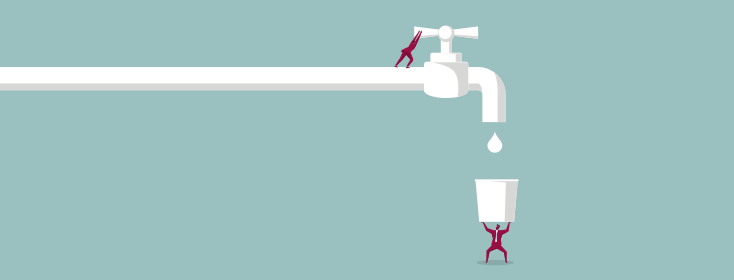Hydration: The Significance and the Struggle
One of my biggest struggles with Crohn’s disease has been staying hydrated. It is something I have struggled with for years and when I had surgery to have my colon removed several years ago, it only got worse. And it’s never more important than during these summer months, especially if you live in the humid South, like I do.
More than half your body weight is made up of water and it’s necessary for every cell and organ in our body to function properly. Water helps in maintaining body temperature, keeping the blood flowing through your body, lubricating joints and removing waste.1
Patients with IBD can become dehydrated very easily.
Most often, it occurs because of increased water loss due to diarrhea, making it even more important to rehydrate properly. The intestines play the biggest role in keeping us hydrated. Therefore, when we’re dealing with intestinal issues, especially during a flare, hydration often comes into play. The intestines actually work with the kidneys to control the level of fluids in the body. The intestines work to absorb water and salt and the kidneys control what is lost through urine. So when fluid is lost due to diarrhea, the kidneys may have difficulty balancing the salt and water, meaning you also may need extra salt in addition to extra water.2
For those like me who do not have a colon, this becomes an even bigger issue. The main job of the colon is to absorb water back into the body.3 So, while hydration is most often an issue for people with IBD during a flare, it’s a constant concern for those of us without a colon.
So what does this all mean? It means that if you have IBD, you need to be extra careful to drink the amount of water your body needs, and if you’ve had your colon removed, you need to be extra, extra careful.
To be honest, I hate drinking water. In order to drink the amount I need, it becomes a chore and something I have to constantly think about throughout the day, even though I know how important it is.
Here are a few things I have learned:
- Water is the best option.1
- If you’re like me and have difficulty drinking large amounts of water throughout the day, drinking fruit and vegetables juices, tea, even coffee and soda can contribute to your daily fluid intake; however, try to avoid large amounts of caffeine because it can actually make dehydration worse.1
- Drinking when you are thirsty is not enough. When you get thirsty, you are already dehydrated.4
- Everyone has different hydration needs, so a set number of ounces per day isn’t going to work for everyone. The best indicator of your hydration is actually the color of your pee. If it’s pale or clear, you’re staying hydrated; if it’s dark and yellow, that means you need to drink more fluids.4
- Try to drink small amounts throughout the day, rather than large amounts at once. I’ll set an alarm to go off every hour to remind me to drink a quick glass of water.
I know there are times I have dealt with fatigue and joint pains and found it was more due to dehydration than directly from Crohn’s disease. So, as we finish off these final weeks of summer, remember to how important hydration is to the health of your entire body and try to drink up! Cheers!

Join the conversation